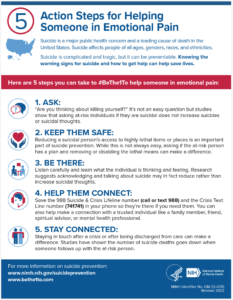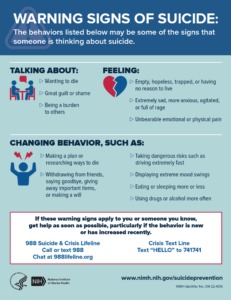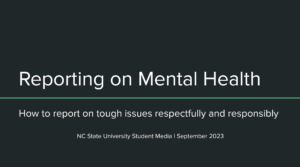College media is in a prime position to be at the forefront of reporting responsibly on mental health
By Ben McNeely
NC State was reeling. Students were stunned, parents were worried, and administrators were trying to respond.
My alma mater, NC State University, went through hell last academic year.
Fourteen students died, seven of which were deaths by suicide. In April, two students took their own lives within a 24-hour period.
September is National Suicide Prevention Month
In the midst of all this, I interviewed for my current job as editorial advisor. In those interviews, I knew training the students on how to report on mental health was essential. That meant coming up with a training module that was grounded in best journalistic practices, as well as busting myths that surround mental health.
 It’s long been known that mental health issues often manifest between the ages of 18 to 24. And despite the advances in science and insurance parity between physical and mental health, barriers to treatment still exist and misinformation still abounds.
It’s long been known that mental health issues often manifest between the ages of 18 to 24. And despite the advances in science and insurance parity between physical and mental health, barriers to treatment still exist and misinformation still abounds.
The way the media covers mental health and its constituent issues—illness, addiction, suicide—can have a profound effect on the audience.
College media is in a prime position to be at the forefront of reporting responsibly on mental health. Mental health issues affect our target audience profoundly. Responsible reporting goes a long way to busting myths, connecting people to resources, and providing hope.
As a professional journalist, I’ve covered my share of death. Much of my coverage relied on instinct and following good ethics: Being respectful of friends and family, minimizing harm, and writing in plain, thoughtful language.
As soon as I came on board at NC State Student Media, my director, Patrick Neal, and I made it a department goal to create this training with an eye toward making it required for all student employees who work with our newspapers.
 As I set out to create this training, I needed to balance my own experiences with best practices. There are plenty of places to find best journalistic practices out there when it comes to mental health, but they are in disparate places. You have to go hunting for them.
As I set out to create this training, I needed to balance my own experiences with best practices. There are plenty of places to find best journalistic practices out there when it comes to mental health, but they are in disparate places. You have to go hunting for them.
I also wanted to show the students the “why” behind responsible reporting on mental health—that what they do can save lives.
I reached out to my friend Rose Hoban, founder and editor of North Carolina Health News. Rose is an award-winning journalist and former public health nurse who started her own news and analysis outlet focusing on health news and policy.
In February, I brought Rose and her mental health reporter Taylor Knopf to campus for a workshop on reporting on suicide. They shared their experiences and best practices with the students.
Along with leaning on Rose and Taylor’s expertise, I took it upon myself to get up to speed as well.
I took an online course from Johns Hopkins University school of public health on responsible reporting on suicide (free through Coursera). I also took a journalism educator training program with Reporting on Addiction over the summer.
Turning to sources like Reporting on Suicide, The Carter Center, the Centers for Disease Control and Prevention, and the Dart Center for Trauma and Journalism, all that gave me the foundation to create this training module that focuses on myth-busting and best practices.

Key takeaways of the training:
-
- The American public sees mental health as a major crisis, especially among young people.
- Suicide is a leading cause of death in the country and a public health issue. Report on it as such.
- Young adults report they struggle with anxiety, depression, and other mental health issues, but also say they have trouble getting access to the resources they need.
- Responsible reporting can mitigate suicide contagion. Sensationalizing mental health issues, addiction, and suicide makes the problem worse.
- Solutions-oriented stories on mental health can offer hope for people who are affected.
- Never make assumptions about anyone’s experience with mental health. While symptoms may be universal, everyone’s story is different.
- Remember what Ted Lasso says: Be curious, not judgmental.
- Taking care of yourself as a journalist is just as important as reporting the story.
I built in breaks in the training for students to take a breather and decompress a little before carrying on. This is heavy stuff, after all.
I also share a little bit about my own struggles with anxiety, depression, and alcohol use with the students as well. My goal with that is to normalize talking about mental health. You never know what someone else is feeling, so being open about your struggles may be the inspiration someone needs to get help, even if they never tell you about it.
Grappling with the mental health of students is a challenge for higher education institutions across the country. I see this training as a way that student media outlets can support their peers and push campuses to take the issue seriously.
By sharing this with other college media advisors, my hope is that others can take it, tailor it to their needs, and empower their students to report on this important issue responsibly and compassionately.


